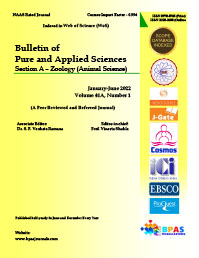Association of Mild, Moderate and Severe Anemia during Pregnancy with Maternal and Foetal Outcome: A Cross Sectional Study on the Poor Pregnant Women of Ajmer City, India
DOI:
https://doi.org/10.48165/Keywords:
Anemia, Apgar score, Birth weight, Blood transfusion, Post-partum haemorrhage, Preeclampsia, Pregnant womenAbstract
The most commonly prevalent harm that occur during pregnancy is anemia caused mainly due to nutritional deficiencies. The present study aims to study the association of mild, moderate and severe anemia with maternal and foetal outcome on the poor pregnant women of Ajmer city of India who are most vulnerable group when concerned with food. It was a cross sectional, descriptive and a questionnaire based study on the target group coming to Janana Hospital for their delivery. Around 300 patients were studied. They were bifurcated as anemic and non anemic. The maternal outcomes post-partum haemorrhage (PPH), preeclampsia and blood transfusion. Foetal outcome was assessed on the basis of their neonatal weight at birth and Apgar score at first and fifth minute. Post delivery, it was found that there was a significant association between anemia during pregnancy and PPH; however severe anemia could be associated with blood transfusion and preeclampsia. Foetal outcomes in terms of birth weight and Apgar score were also significantly correlated with an increase in the intensity of anemia. The study suggests a strong adverse association between maternal anemia on maternal and foetal outcome among the target group.
Downloads
References
Ali, A. A., Rayis, D. A., Abdallah, T. M., Elbashir, M. I., & Adam, I. (2011). Severe anaemia is associated with a higher risk for preeclampsia and poor perinatal outcomes in Kassala hospital, eastern Sudan. BMC Research Notes, 4(1), 311. https://doi.org/10.1186/1756-0500-4-311
Cnattingius, S., Johansson, S., & Razaz, N. (2020). Apgar Score and Risk of Neonatal Death among Preterm Infants. New England Journal of Medicine, 383(1), 49–57. https://doi.org/10.1056/NEJMoa1915075
Endeshaw, M., Ambaw, F., Aragaw, A., & Ayalew, A. (2014). Effect of Maternal
Nutrition and Dietary Habits on Preeclampsia: A Case-Control Study. International Journal of Clinical Medicine, 05(21), 1405. https://doi.org/10.4236/ijcm.2014.521179
Helmy, M. E., Elkhouly, N. I., & Ghalab, R. A. (2018). Maternal anemia with pregnancy and its adverse effects. Menoufia Medical Journal, 31(1), 7.
Iyengar, K. (2012). Early Postpartum Maternal Morbidity among Rural Women of Rajasthan, India: A Community-based Study. Journal of Health, Population and Nutrition, 30(2), 213–225. https://doi.org/10.3329/jhpn.v30i2.11316
Labib, H., Ahmed, A., & Abdelmoaty, M. (2021). Effect of moderate iron deficiency anemia during pregnancy on maternal and fetal outcome. Al-Azhar International Medical Journal, 2(7), 41–45.
Rouse, D. J., MacPherson, C., Landon, M., Varner, M. W., Leveno, K. J., Moawad, A. H., Spong, C. Y., Caritis, S. N., Meis, P. J., & Wapner, R. J. (2006). Blood transfusion and cesarean delivery. Obstetrics & Gynecology, 108(4), 891–897.
Young, M. F., Oaks, B., Tandon, S., Martorell, R., Dewey, K., & Wendt, A. (2019). Maternal Hemoglobin Concentrations Across Pregnancy and Maternal and Child Health: A Systematic Review and Meta-analysis (P11-033-19). Current Developments in Nutrition, 3(Supplement_1), nzz048-P11.
